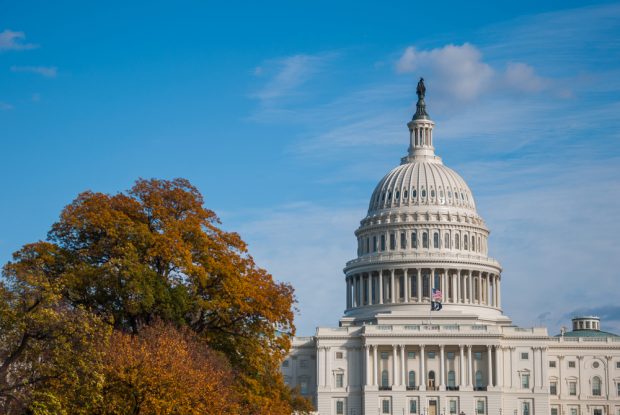 United States Capitol Building, Washington D.C. (Credit/Shutterstock)
United States Capitol Building, Washington D.C. (Credit/Shutterstock)
There are some things on which people just cannot agree: There are people who truly feel that going to Disneyland is a magical experience and go as many times as possible. Then there are those of us who would rather get a root canal. There are those of us who must compulsively strike up a conversation with the passenger in the seat next to them, and those of us who use AirPods as the modern-day equivalent of the Do Not Disturb sign. And there are those of us who love D.C. and visit it as much as possible, and those of us who despise politics and would rather hike in the Sahara without rather than hobnob with their elected representatives.
Nevertheless, we all have to do things we don't want to do, and even if you are one of those folks who really doesn't like D.C., you should make a plan to go this fall. It is shaping up as one of the key windows for legislative activity for at least the next year and a half.
Recommended For You
There are two key issues that could impact your credit union's bottom line and the way it provides services to your members that we could see movement on. First, there is the proposal to extend the Durbin Amendment to credit card issuers with $100 billion in assets. Second, there is the real possibility that we may finally get legislation passed legalizing banking services from marijuana related businesses.
Why should you go in the fall? Because September marks the start of the last legislative activity before we enter a presidential election year with both the Senate and the House of Representatives in play. Call me cynical, but I don't see much of any value getting done in what promises to be one of the most divisive periods of electioneering in our nation's history. That's not an exaggeration.
Why is this legislation worth a visit to your representatives? First, let's talk about marijuana banking. According to my Google search – after all, the internet is never wrong – there are 37 states that have legalized marijuana to some degree, and 18 that have legalized it completely. If you are in one of those states, then you know that financial institutions find themselves in an "Alice in Wonderland" situation.
In New York, for example, credit unions are being urged to help fund and provide loans to help marijuana businesses. The state argues that these businesses could provide an important source of economic development, particularly for low-income communities. However, any credit union or bank providing these services has to balance the importance of advancing this business goal against the reality that it is technically violating federal law.
But we may finally be seeing legislative movement. During a press conference before he left town for August, Sen. Chuck Schumer (D-N.Y.) listed marijuana banking as one of the Senate's top priorities when it returns in September. This is big news. While the Senator has never been opposed to cannabis banking legislation, he has in the past chosen to champion more far-reaching measure to legalize marijuana on the federal level. The fact that he is willing to consider a more narrowly focused approach signals that senators realize that the current situation helps no one.
Incidentally, if you are in one of those states that hasn't yet addressed marijuana legalization, you still have a stake in federal action. Chances are, your credit union is either holding funds related to marijuana banking or providing banking services to members engaged with the industry, whether you realize it or not.
Why should you care about the Durbin Amendment? Senate Bill 1838 would mandate that financial institutions with $100 billion or more in assets give merchants at least two networks on which to process credit card transactions.
Even though the vast majority of credit unions can only dream of reaching that asset size, this legislation is the classic example of the camel's nose under the circus tent. Once Congress accepts the premise of this bill, there is really not a good argument against applying it to smaller and smaller institutions.
Didn't the trades keep this proposal from being included in either the Senate or House version of the National Defense Authorization Act? Yes, they did. But this is one of those issues that isn't going to go away and there is much horse trading that will have to be done before the Senate and House agree to a final version of this legislation. Cracking down on so-called junk fees is bad policy but good politics and, as the merchants tell the story, consumers are being gouged by nefarious interchange fees.
Don't get me wrong, I like to pay as little as possible for the products I buy as I can. But I believe the free market does a better job of setting prices than senators do. If you went to a Mets game this summer or plan on attending the U.S. Tennis open – which by the way, is one of the country's great sporting events – good luck trying to pay for anything with cash. The reality is that merchants accept both debit and credit cards because it is in their financial interest to do so. Call me wacky, but I think Amazon is more than capable of negotiating its own contracts.
And when you talk to your legislators, point out to them the cynicism of suggesting that regulating interchange fees is pro-consumer. The idea that merchants will pass on interchange fee reductions to the public is fanciful. The vast majority of merchants run small businesses in which they hope to generate enough income to pay the bills and support their family while charging customers a fair price for their products. Why in God's name would they suddenly refund consumers for goods that they are already willing to purchase at a higher price? That's not how the free market operates.
If this legislation ever passes, consumers won't get cheaper products; they will get fewer benefits out of using their credit cards.
 Henry Meier, Esq.
Henry Meier, Esq. Henry Meier is the former General Counsel of the New York Credit Union Association, where he authored the popular New York State of Mind blog. He now provides legal advice to credit unions on a broad range of legal, regulatory and legislative issues. He can be reached at (518) 223-5126 or via email at [email protected].
© Touchpoint Markets, All Rights Reserved. Request academic re-use from www.copyright.com. All other uses, submit a request to [email protected]. For more inforrmation visit Asset & Logo Licensing.






